Entrepreneurship Assignment: Types, Ventures, and Impact
VerifiedAdded on 2020/12/29
|11
|3553
|227
Report
AI Summary
This report delves into the multifaceted world of entrepreneurship and small business management, exploring various types of entrepreneurial ventures, including large organizations, small businesses, scalable start-ups, and social enterprises. It examines the relationship between these ventures and different typologies of entrepreneurship, such as lifestyle, growth, and gender-based models. The report interprets statistics to illustrate the significant impact of micro and small businesses on the economy, highlighting their role in job creation, revenue generation, and overall economic growth. Furthermore, it underscores the importance of small businesses and start-up companies in fostering social and economic development, emphasizing their contributions to turnover, improved standards of living, and diversity. The report also differentiates between the characteristics, traits, and skills of successful entrepreneurs and business managers, providing insights into the mindsets and motivations that drive entrepreneurial success, with examples of Henry Ford and Bill Gates. Finally, it discusses how background and experience can both hinder and foster entrepreneurial endeavors.

Entrepreneurship and
Small Business
Management
Small Business
Management
Paraphrase This Document
Need a fresh take? Get an instant paraphrase of this document with our AI Paraphraser
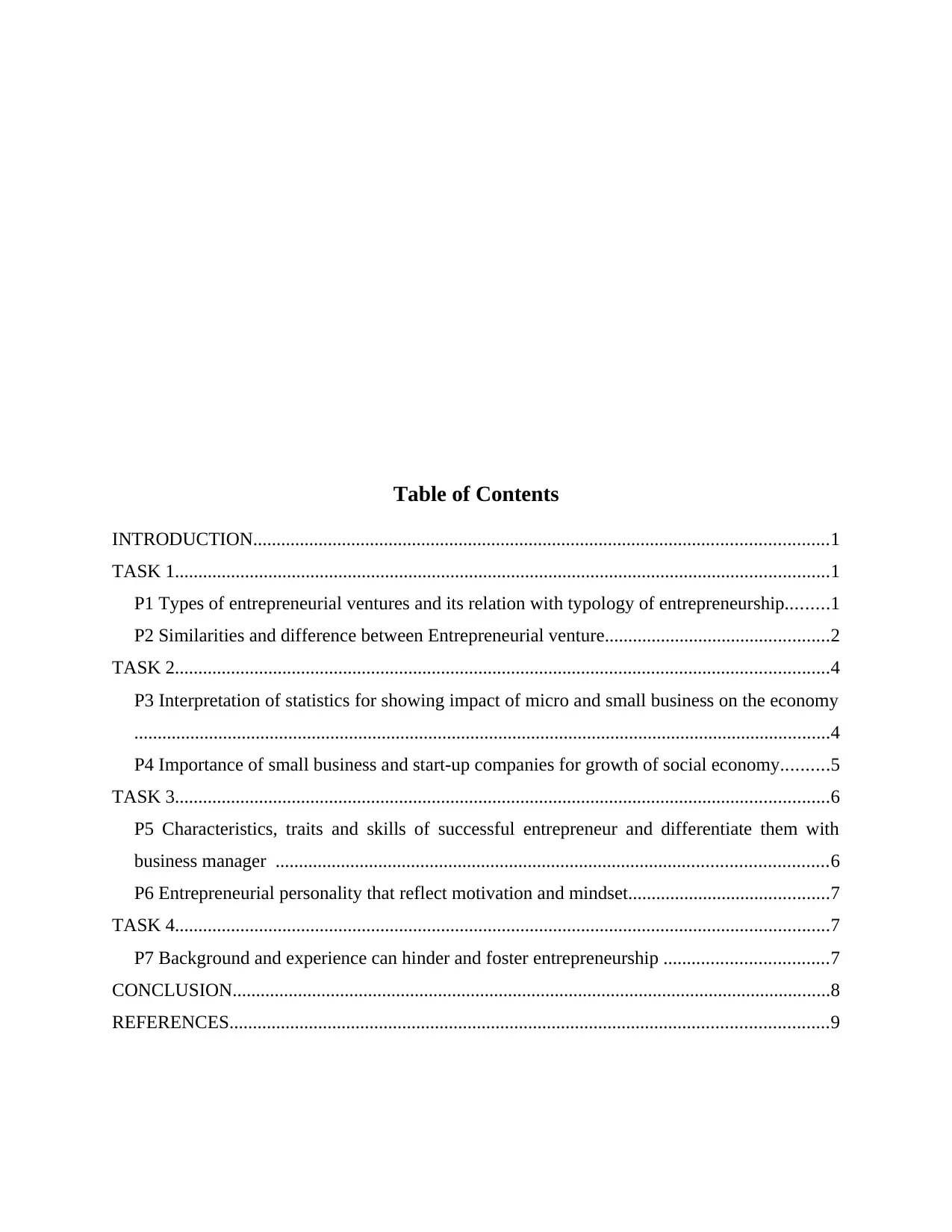
Table of Contents
INTRODUCTION...........................................................................................................................1
TASK 1............................................................................................................................................1
P1 Types of entrepreneurial ventures and its relation with typology of entrepreneurship.........1
P2 Similarities and difference between Entrepreneurial venture................................................2
TASK 2............................................................................................................................................4
P3 Interpretation of statistics for showing impact of micro and small business on the economy
.....................................................................................................................................................4
P4 Importance of small business and start-up companies for growth of social economy..........5
TASK 3............................................................................................................................................6
P5 Characteristics, traits and skills of successful entrepreneur and differentiate them with
business manager ......................................................................................................................6
P6 Entrepreneurial personality that reflect motivation and mindset...........................................7
TASK 4............................................................................................................................................7
P7 Background and experience can hinder and foster entrepreneurship ...................................7
CONCLUSION................................................................................................................................8
REFERENCES................................................................................................................................9
INTRODUCTION...........................................................................................................................1
TASK 1............................................................................................................................................1
P1 Types of entrepreneurial ventures and its relation with typology of entrepreneurship.........1
P2 Similarities and difference between Entrepreneurial venture................................................2
TASK 2............................................................................................................................................4
P3 Interpretation of statistics for showing impact of micro and small business on the economy
.....................................................................................................................................................4
P4 Importance of small business and start-up companies for growth of social economy..........5
TASK 3............................................................................................................................................6
P5 Characteristics, traits and skills of successful entrepreneur and differentiate them with
business manager ......................................................................................................................6
P6 Entrepreneurial personality that reflect motivation and mindset...........................................7
TASK 4............................................................................................................................................7
P7 Background and experience can hinder and foster entrepreneurship ...................................7
CONCLUSION................................................................................................................................8
REFERENCES................................................................................................................................9
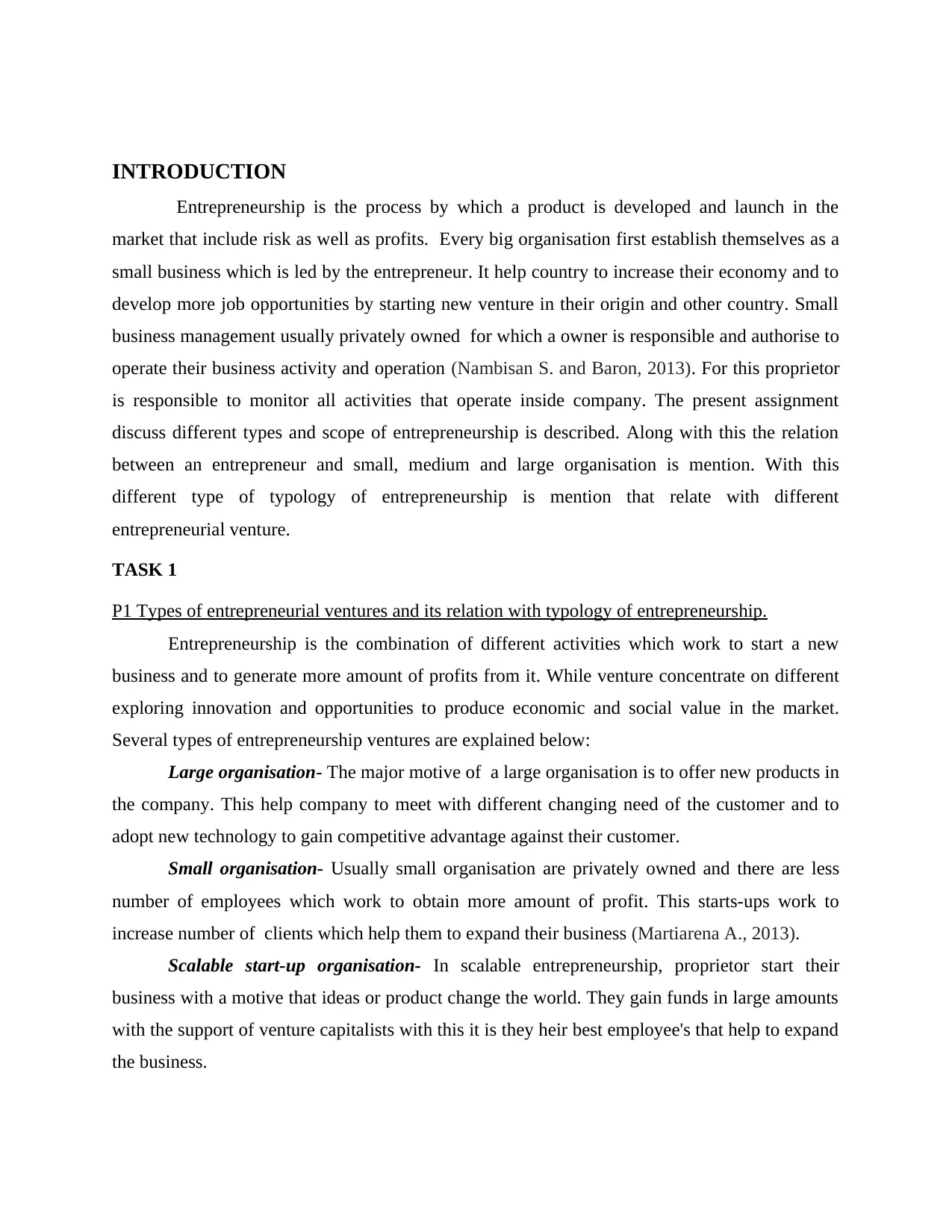
INTRODUCTION
Entrepreneurship is the process by which a product is developed and launch in the
market that include risk as well as profits. Every big organisation first establish themselves as a
small business which is led by the entrepreneur. It help country to increase their economy and to
develop more job opportunities by starting new venture in their origin and other country. Small
business management usually privately owned for which a owner is responsible and authorise to
operate their business activity and operation (Nambisan S. and Baron, 2013). For this proprietor
is responsible to monitor all activities that operate inside company. The present assignment
discuss different types and scope of entrepreneurship is described. Along with this the relation
between an entrepreneur and small, medium and large organisation is mention. With this
different type of typology of entrepreneurship is mention that relate with different
entrepreneurial venture.
TASK 1
P1 Types of entrepreneurial ventures and its relation with typology of entrepreneurship.
Entrepreneurship is the combination of different activities which work to start a new
business and to generate more amount of profits from it. While venture concentrate on different
exploring innovation and opportunities to produce economic and social value in the market.
Several types of entrepreneurship ventures are explained below:
Large organisation- The major motive of a large organisation is to offer new products in
the company. This help company to meet with different changing need of the customer and to
adopt new technology to gain competitive advantage against their customer.
Small organisation- Usually small organisation are privately owned and there are less
number of employees which work to obtain more amount of profit. This starts-ups work to
increase number of clients which help them to expand their business (Martiarena A., 2013).
Scalable start-up organisation- In scalable entrepreneurship, proprietor start their
business with a motive that ideas or product change the world. They gain funds in large amounts
with the support of venture capitalists with this it is they heir best employee's that help to expand
the business.
Entrepreneurship is the process by which a product is developed and launch in the
market that include risk as well as profits. Every big organisation first establish themselves as a
small business which is led by the entrepreneur. It help country to increase their economy and to
develop more job opportunities by starting new venture in their origin and other country. Small
business management usually privately owned for which a owner is responsible and authorise to
operate their business activity and operation (Nambisan S. and Baron, 2013). For this proprietor
is responsible to monitor all activities that operate inside company. The present assignment
discuss different types and scope of entrepreneurship is described. Along with this the relation
between an entrepreneur and small, medium and large organisation is mention. With this
different type of typology of entrepreneurship is mention that relate with different
entrepreneurial venture.
TASK 1
P1 Types of entrepreneurial ventures and its relation with typology of entrepreneurship.
Entrepreneurship is the combination of different activities which work to start a new
business and to generate more amount of profits from it. While venture concentrate on different
exploring innovation and opportunities to produce economic and social value in the market.
Several types of entrepreneurship ventures are explained below:
Large organisation- The major motive of a large organisation is to offer new products in
the company. This help company to meet with different changing need of the customer and to
adopt new technology to gain competitive advantage against their customer.
Small organisation- Usually small organisation are privately owned and there are less
number of employees which work to obtain more amount of profit. This starts-ups work to
increase number of clients which help them to expand their business (Martiarena A., 2013).
Scalable start-up organisation- In scalable entrepreneurship, proprietor start their
business with a motive that ideas or product change the world. They gain funds in large amounts
with the support of venture capitalists with this it is they heir best employee's that help to expand
the business.
⊘ This is a preview!⊘
Do you want full access?
Subscribe today to unlock all pages.

Trusted by 1+ million students worldwide
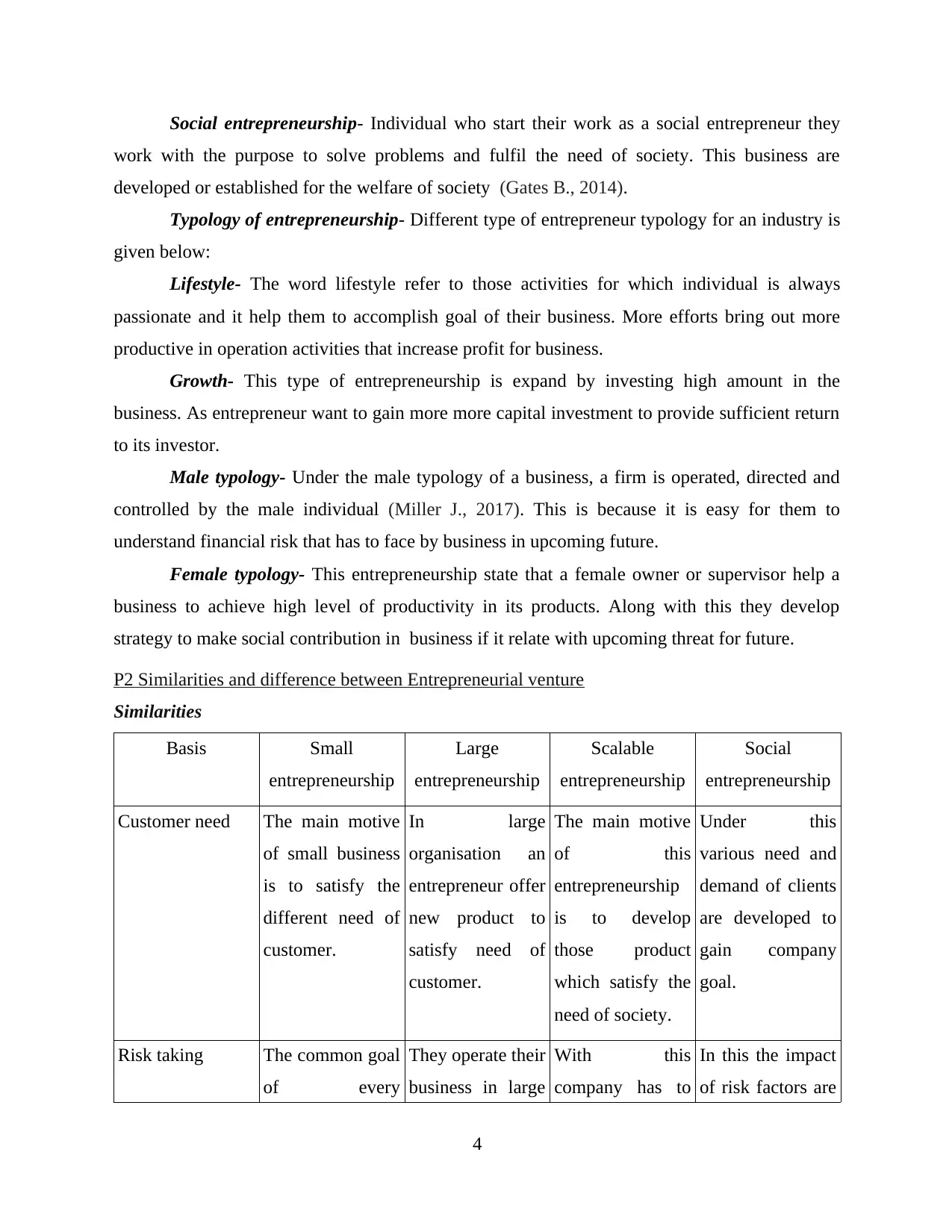
Social entrepreneurship- Individual who start their work as a social entrepreneur they
work with the purpose to solve problems and fulfil the need of society. This business are
developed or established for the welfare of society (Gates B., 2014).
Typology of entrepreneurship- Different type of entrepreneur typology for an industry is
given below:
Lifestyle- The word lifestyle refer to those activities for which individual is always
passionate and it help them to accomplish goal of their business. More efforts bring out more
productive in operation activities that increase profit for business.
Growth- This type of entrepreneurship is expand by investing high amount in the
business. As entrepreneur want to gain more more capital investment to provide sufficient return
to its investor.
Male typology- Under the male typology of a business, a firm is operated, directed and
controlled by the male individual (Miller J., 2017). This is because it is easy for them to
understand financial risk that has to face by business in upcoming future.
Female typology- This entrepreneurship state that a female owner or supervisor help a
business to achieve high level of productivity in its products. Along with this they develop
strategy to make social contribution in business if it relate with upcoming threat for future.
P2 Similarities and difference between Entrepreneurial venture
Similarities
Basis Small
entrepreneurship
Large
entrepreneurship
Scalable
entrepreneurship
Social
entrepreneurship
Customer need The main motive
of small business
is to satisfy the
different need of
customer.
In large
organisation an
entrepreneur offer
new product to
satisfy need of
customer.
The main motive
of this
entrepreneurship
is to develop
those product
which satisfy the
need of society.
Under this
various need and
demand of clients
are developed to
gain company
goal.
Risk taking The common goal
of every
They operate their
business in large
With this
company has to
In this the impact
of risk factors are
4
work with the purpose to solve problems and fulfil the need of society. This business are
developed or established for the welfare of society (Gates B., 2014).
Typology of entrepreneurship- Different type of entrepreneur typology for an industry is
given below:
Lifestyle- The word lifestyle refer to those activities for which individual is always
passionate and it help them to accomplish goal of their business. More efforts bring out more
productive in operation activities that increase profit for business.
Growth- This type of entrepreneurship is expand by investing high amount in the
business. As entrepreneur want to gain more more capital investment to provide sufficient return
to its investor.
Male typology- Under the male typology of a business, a firm is operated, directed and
controlled by the male individual (Miller J., 2017). This is because it is easy for them to
understand financial risk that has to face by business in upcoming future.
Female typology- This entrepreneurship state that a female owner or supervisor help a
business to achieve high level of productivity in its products. Along with this they develop
strategy to make social contribution in business if it relate with upcoming threat for future.
P2 Similarities and difference between Entrepreneurial venture
Similarities
Basis Small
entrepreneurship
Large
entrepreneurship
Scalable
entrepreneurship
Social
entrepreneurship
Customer need The main motive
of small business
is to satisfy the
different need of
customer.
In large
organisation an
entrepreneur offer
new product to
satisfy need of
customer.
The main motive
of this
entrepreneurship
is to develop
those product
which satisfy the
need of society.
Under this
various need and
demand of clients
are developed to
gain company
goal.
Risk taking The common goal
of every
They operate their
business in large
With this
company has to
In this the impact
of risk factors are
4
Paraphrase This Document
Need a fresh take? Get an instant paraphrase of this document with our AI Paraphraser
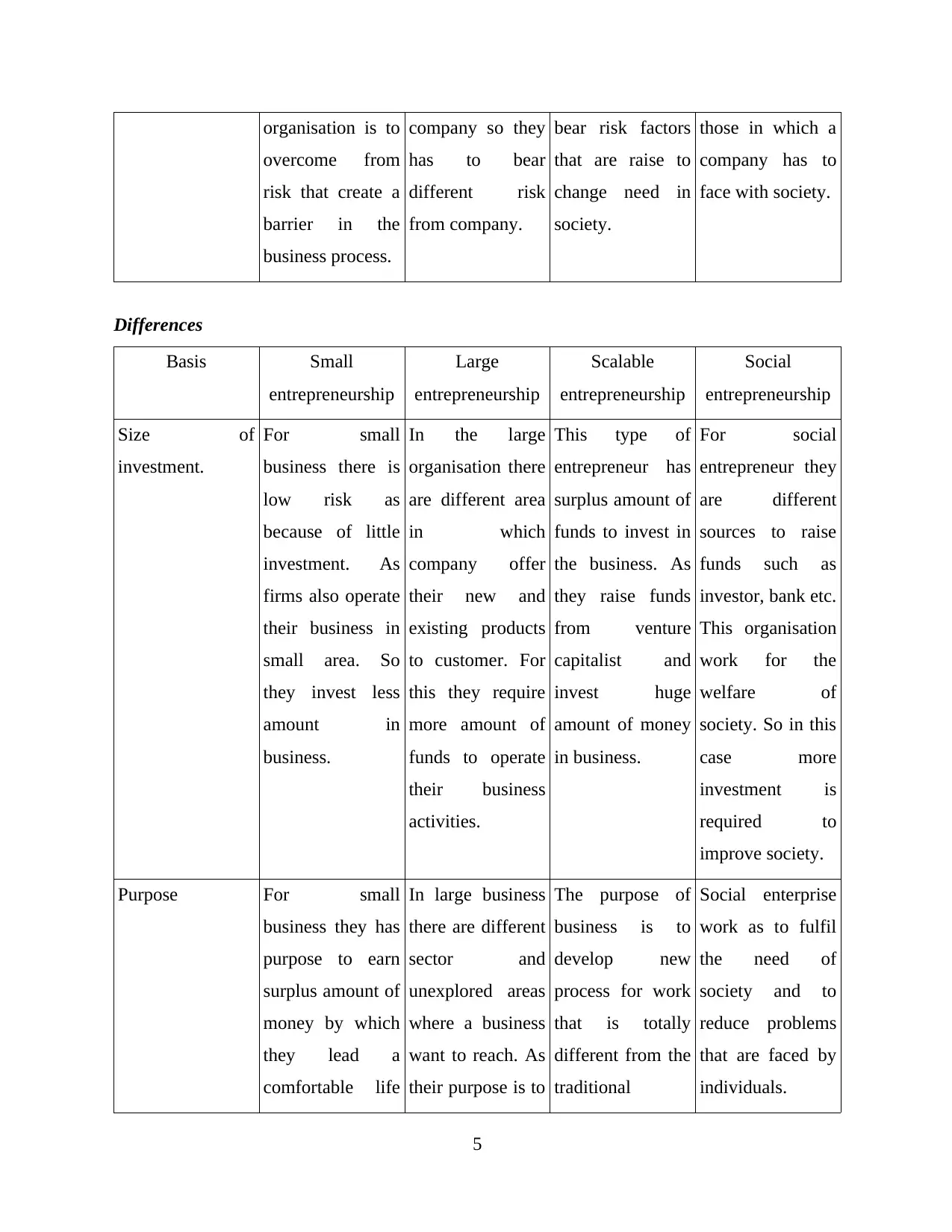
organisation is to
overcome from
risk that create a
barrier in the
business process.
company so they
has to bear
different risk
from company.
bear risk factors
that are raise to
change need in
society.
those in which a
company has to
face with society.
Differences
Basis Small
entrepreneurship
Large
entrepreneurship
Scalable
entrepreneurship
Social
entrepreneurship
Size of
investment.
For small
business there is
low risk as
because of little
investment. As
firms also operate
their business in
small area. So
they invest less
amount in
business.
In the large
organisation there
are different area
in which
company offer
their new and
existing products
to customer. For
this they require
more amount of
funds to operate
their business
activities.
This type of
entrepreneur has
surplus amount of
funds to invest in
the business. As
they raise funds
from venture
capitalist and
invest huge
amount of money
in business.
For social
entrepreneur they
are different
sources to raise
funds such as
investor, bank etc.
This organisation
work for the
welfare of
society. So in this
case more
investment is
required to
improve society.
Purpose For small
business they has
purpose to earn
surplus amount of
money by which
they lead a
comfortable life
In large business
there are different
sector and
unexplored areas
where a business
want to reach. As
their purpose is to
The purpose of
business is to
develop new
process for work
that is totally
different from the
traditional
Social enterprise
work as to fulfil
the need of
society and to
reduce problems
that are faced by
individuals.
5
overcome from
risk that create a
barrier in the
business process.
company so they
has to bear
different risk
from company.
bear risk factors
that are raise to
change need in
society.
those in which a
company has to
face with society.
Differences
Basis Small
entrepreneurship
Large
entrepreneurship
Scalable
entrepreneurship
Social
entrepreneurship
Size of
investment.
For small
business there is
low risk as
because of little
investment. As
firms also operate
their business in
small area. So
they invest less
amount in
business.
In the large
organisation there
are different area
in which
company offer
their new and
existing products
to customer. For
this they require
more amount of
funds to operate
their business
activities.
This type of
entrepreneur has
surplus amount of
funds to invest in
the business. As
they raise funds
from venture
capitalist and
invest huge
amount of money
in business.
For social
entrepreneur they
are different
sources to raise
funds such as
investor, bank etc.
This organisation
work for the
welfare of
society. So in this
case more
investment is
required to
improve society.
Purpose For small
business they has
purpose to earn
surplus amount of
money by which
they lead a
comfortable life
In large business
there are different
sector and
unexplored areas
where a business
want to reach. As
their purpose is to
The purpose of
business is to
develop new
process for work
that is totally
different from the
traditional
Social enterprise
work as to fulfil
the need of
society and to
reduce problems
that are faced by
individuals.
5
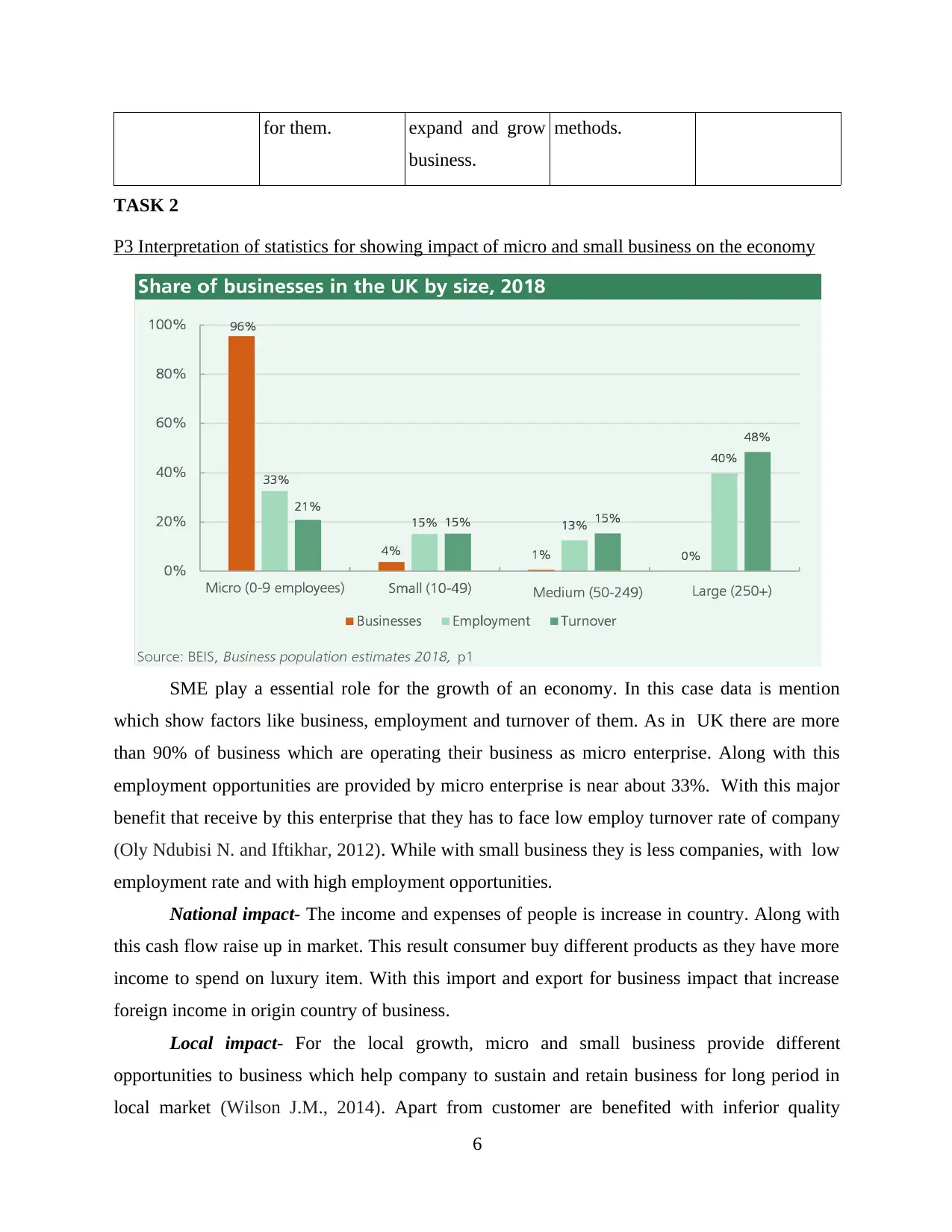
for them. expand and grow
business.
methods.
TASK 2
P3 Interpretation of statistics for showing impact of micro and small business on the economy
SME play a essential role for the growth of an economy. In this case data is mention
which show factors like business, employment and turnover of them. As in UK there are more
than 90% of business which are operating their business as micro enterprise. Along with this
employment opportunities are provided by micro enterprise is near about 33%. With this major
benefit that receive by this enterprise that they has to face low employ turnover rate of company
(Oly Ndubisi N. and Iftikhar, 2012). While with small business they is less companies, with low
employment rate and with high employment opportunities.
National impact- The income and expenses of people is increase in country. Along with
this cash flow raise up in market. This result consumer buy different products as they have more
income to spend on luxury item. With this import and export for business impact that increase
foreign income in origin country of business.
Local impact- For the local growth, micro and small business provide different
opportunities to business which help company to sustain and retain business for long period in
local market (Wilson J.M., 2014). Apart from customer are benefited with inferior quality
6
business.
methods.
TASK 2
P3 Interpretation of statistics for showing impact of micro and small business on the economy
SME play a essential role for the growth of an economy. In this case data is mention
which show factors like business, employment and turnover of them. As in UK there are more
than 90% of business which are operating their business as micro enterprise. Along with this
employment opportunities are provided by micro enterprise is near about 33%. With this major
benefit that receive by this enterprise that they has to face low employ turnover rate of company
(Oly Ndubisi N. and Iftikhar, 2012). While with small business they is less companies, with low
employment rate and with high employment opportunities.
National impact- The income and expenses of people is increase in country. Along with
this cash flow raise up in market. This result consumer buy different products as they have more
income to spend on luxury item. With this import and export for business impact that increase
foreign income in origin country of business.
Local impact- For the local growth, micro and small business provide different
opportunities to business which help company to sustain and retain business for long period in
local market (Wilson J.M., 2014). Apart from customer are benefited with inferior quality
6
⊘ This is a preview!⊘
Do you want full access?
Subscribe today to unlock all pages.

Trusted by 1+ million students worldwide
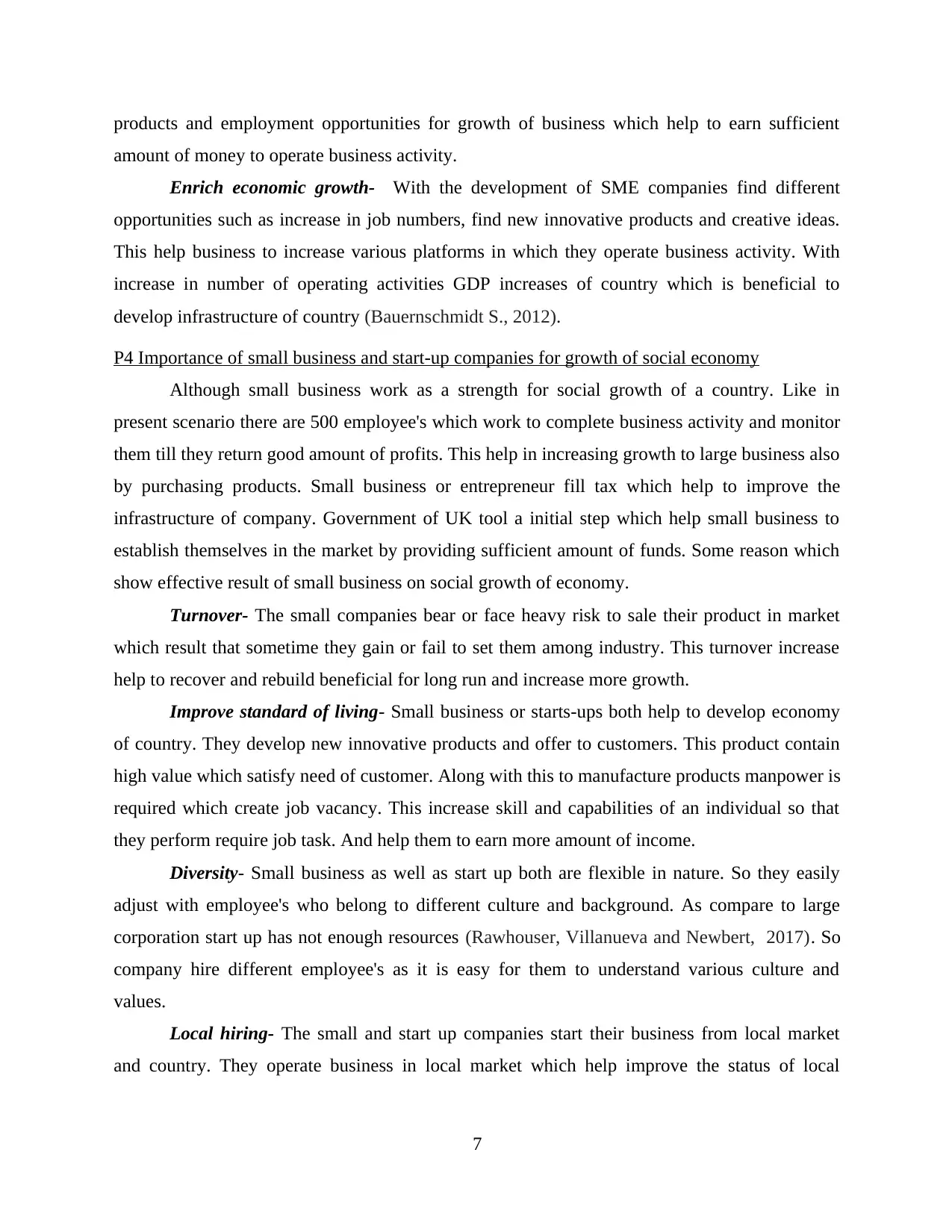
products and employment opportunities for growth of business which help to earn sufficient
amount of money to operate business activity.
Enrich economic growth- With the development of SME companies find different
opportunities such as increase in job numbers, find new innovative products and creative ideas.
This help business to increase various platforms in which they operate business activity. With
increase in number of operating activities GDP increases of country which is beneficial to
develop infrastructure of country (Bauernschmidt S., 2012).
P4 Importance of small business and start-up companies for growth of social economy
Although small business work as a strength for social growth of a country. Like in
present scenario there are 500 employee's which work to complete business activity and monitor
them till they return good amount of profits. This help in increasing growth to large business also
by purchasing products. Small business or entrepreneur fill tax which help to improve the
infrastructure of company. Government of UK tool a initial step which help small business to
establish themselves in the market by providing sufficient amount of funds. Some reason which
show effective result of small business on social growth of economy.
Turnover- The small companies bear or face heavy risk to sale their product in market
which result that sometime they gain or fail to set them among industry. This turnover increase
help to recover and rebuild beneficial for long run and increase more growth.
Improve standard of living- Small business or starts-ups both help to develop economy
of country. They develop new innovative products and offer to customers. This product contain
high value which satisfy need of customer. Along with this to manufacture products manpower is
required which create job vacancy. This increase skill and capabilities of an individual so that
they perform require job task. And help them to earn more amount of income.
Diversity- Small business as well as start up both are flexible in nature. So they easily
adjust with employee's who belong to different culture and background. As compare to large
corporation start up has not enough resources (Rawhouser, Villanueva and Newbert, 2017). So
company hire different employee's as it is easy for them to understand various culture and
values.
Local hiring- The small and start up companies start their business from local market
and country. They operate business in local market which help improve the status of local
7
amount of money to operate business activity.
Enrich economic growth- With the development of SME companies find different
opportunities such as increase in job numbers, find new innovative products and creative ideas.
This help business to increase various platforms in which they operate business activity. With
increase in number of operating activities GDP increases of country which is beneficial to
develop infrastructure of country (Bauernschmidt S., 2012).
P4 Importance of small business and start-up companies for growth of social economy
Although small business work as a strength for social growth of a country. Like in
present scenario there are 500 employee's which work to complete business activity and monitor
them till they return good amount of profits. This help in increasing growth to large business also
by purchasing products. Small business or entrepreneur fill tax which help to improve the
infrastructure of company. Government of UK tool a initial step which help small business to
establish themselves in the market by providing sufficient amount of funds. Some reason which
show effective result of small business on social growth of economy.
Turnover- The small companies bear or face heavy risk to sale their product in market
which result that sometime they gain or fail to set them among industry. This turnover increase
help to recover and rebuild beneficial for long run and increase more growth.
Improve standard of living- Small business or starts-ups both help to develop economy
of country. They develop new innovative products and offer to customers. This product contain
high value which satisfy need of customer. Along with this to manufacture products manpower is
required which create job vacancy. This increase skill and capabilities of an individual so that
they perform require job task. And help them to earn more amount of income.
Diversity- Small business as well as start up both are flexible in nature. So they easily
adjust with employee's who belong to different culture and background. As compare to large
corporation start up has not enough resources (Rawhouser, Villanueva and Newbert, 2017). So
company hire different employee's as it is easy for them to understand various culture and
values.
Local hiring- The small and start up companies start their business from local market
and country. They operate business in local market which help improve the status of local
7
Paraphrase This Document
Need a fresh take? Get an instant paraphrase of this document with our AI Paraphraser
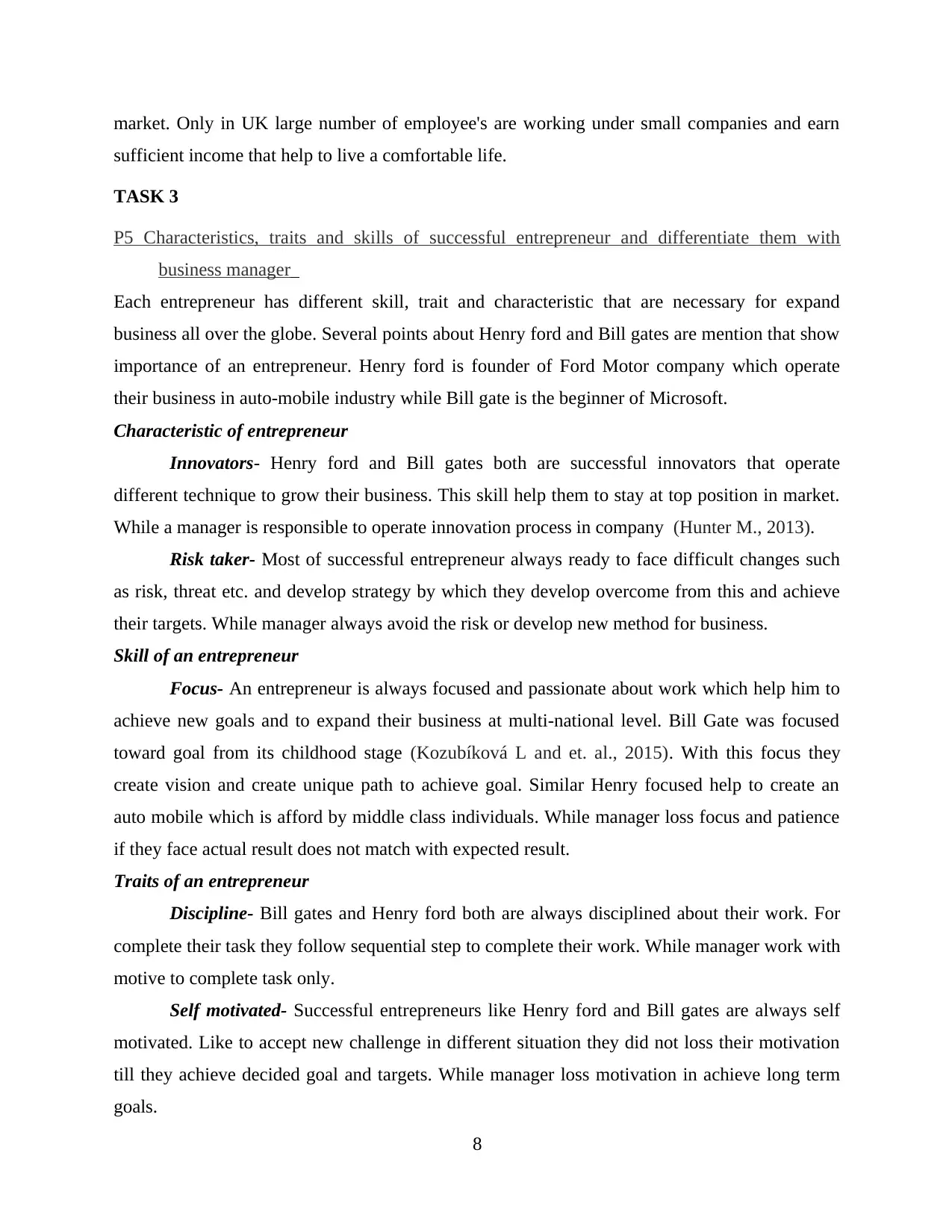
market. Only in UK large number of employee's are working under small companies and earn
sufficient income that help to live a comfortable life.
TASK 3
P5 Characteristics, traits and skills of successful entrepreneur and differentiate them with
business manager
Each entrepreneur has different skill, trait and characteristic that are necessary for expand
business all over the globe. Several points about Henry ford and Bill gates are mention that show
importance of an entrepreneur. Henry ford is founder of Ford Motor company which operate
their business in auto-mobile industry while Bill gate is the beginner of Microsoft.
Characteristic of entrepreneur
Innovators- Henry ford and Bill gates both are successful innovators that operate
different technique to grow their business. This skill help them to stay at top position in market.
While a manager is responsible to operate innovation process in company (Hunter M., 2013).
Risk taker- Most of successful entrepreneur always ready to face difficult changes such
as risk, threat etc. and develop strategy by which they develop overcome from this and achieve
their targets. While manager always avoid the risk or develop new method for business.
Skill of an entrepreneur
Focus- An entrepreneur is always focused and passionate about work which help him to
achieve new goals and to expand their business at multi-national level. Bill Gate was focused
toward goal from its childhood stage (Kozubíková L and et. al., 2015). With this focus they
create vision and create unique path to achieve goal. Similar Henry focused help to create an
auto mobile which is afford by middle class individuals. While manager loss focus and patience
if they face actual result does not match with expected result.
Traits of an entrepreneur
Discipline- Bill gates and Henry ford both are always disciplined about their work. For
complete their task they follow sequential step to complete their work. While manager work with
motive to complete task only.
Self motivated- Successful entrepreneurs like Henry ford and Bill gates are always self
motivated. Like to accept new challenge in different situation they did not loss their motivation
till they achieve decided goal and targets. While manager loss motivation in achieve long term
goals.
8
sufficient income that help to live a comfortable life.
TASK 3
P5 Characteristics, traits and skills of successful entrepreneur and differentiate them with
business manager
Each entrepreneur has different skill, trait and characteristic that are necessary for expand
business all over the globe. Several points about Henry ford and Bill gates are mention that show
importance of an entrepreneur. Henry ford is founder of Ford Motor company which operate
their business in auto-mobile industry while Bill gate is the beginner of Microsoft.
Characteristic of entrepreneur
Innovators- Henry ford and Bill gates both are successful innovators that operate
different technique to grow their business. This skill help them to stay at top position in market.
While a manager is responsible to operate innovation process in company (Hunter M., 2013).
Risk taker- Most of successful entrepreneur always ready to face difficult changes such
as risk, threat etc. and develop strategy by which they develop overcome from this and achieve
their targets. While manager always avoid the risk or develop new method for business.
Skill of an entrepreneur
Focus- An entrepreneur is always focused and passionate about work which help him to
achieve new goals and to expand their business at multi-national level. Bill Gate was focused
toward goal from its childhood stage (Kozubíková L and et. al., 2015). With this focus they
create vision and create unique path to achieve goal. Similar Henry focused help to create an
auto mobile which is afford by middle class individuals. While manager loss focus and patience
if they face actual result does not match with expected result.
Traits of an entrepreneur
Discipline- Bill gates and Henry ford both are always disciplined about their work. For
complete their task they follow sequential step to complete their work. While manager work with
motive to complete task only.
Self motivated- Successful entrepreneurs like Henry ford and Bill gates are always self
motivated. Like to accept new challenge in different situation they did not loss their motivation
till they achieve decided goal and targets. While manager loss motivation in achieve long term
goals.
8
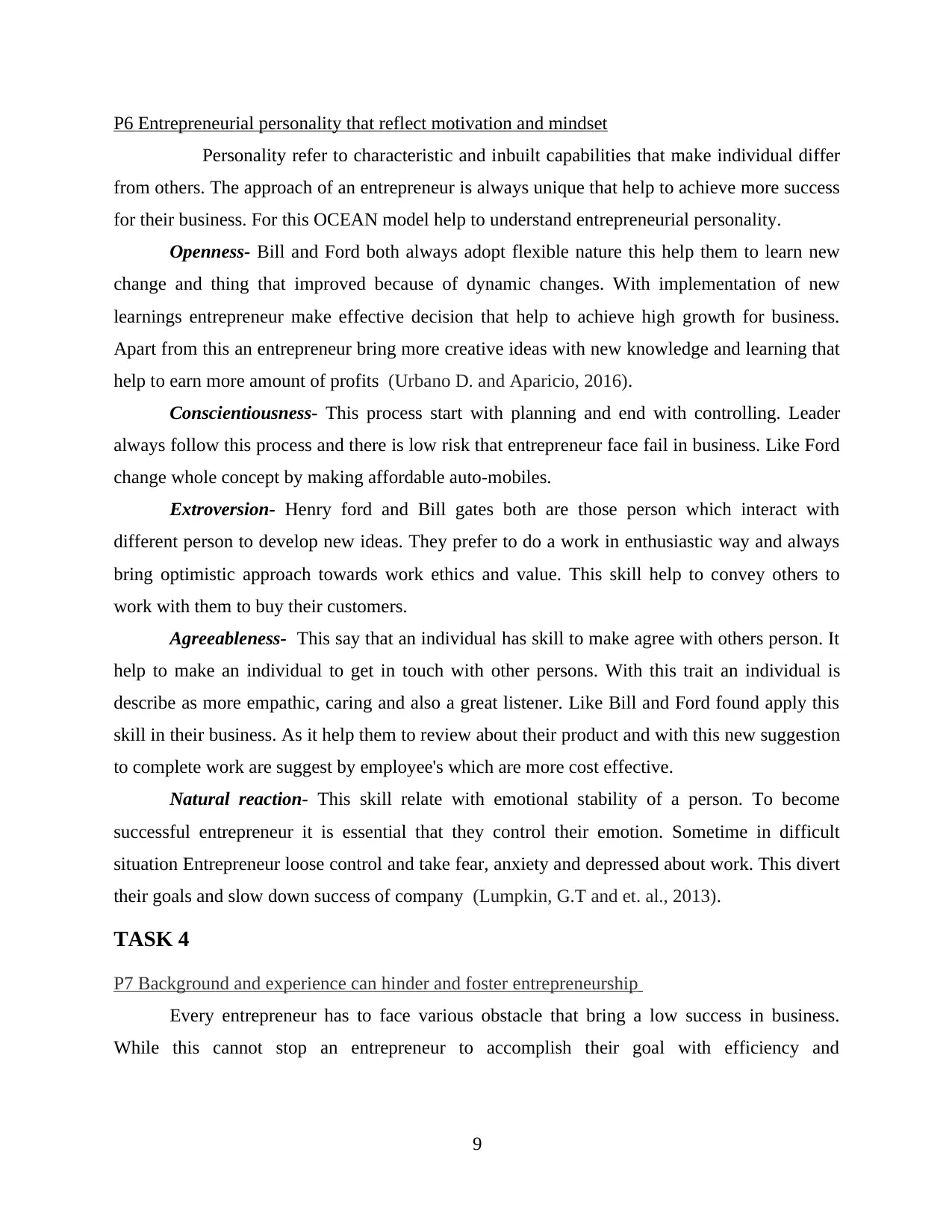
P6 Entrepreneurial personality that reflect motivation and mindset
Personality refer to characteristic and inbuilt capabilities that make individual differ
from others. The approach of an entrepreneur is always unique that help to achieve more success
for their business. For this OCEAN model help to understand entrepreneurial personality.
Openness- Bill and Ford both always adopt flexible nature this help them to learn new
change and thing that improved because of dynamic changes. With implementation of new
learnings entrepreneur make effective decision that help to achieve high growth for business.
Apart from this an entrepreneur bring more creative ideas with new knowledge and learning that
help to earn more amount of profits (Urbano D. and Aparicio, 2016).
Conscientiousness- This process start with planning and end with controlling. Leader
always follow this process and there is low risk that entrepreneur face fail in business. Like Ford
change whole concept by making affordable auto-mobiles.
Extroversion- Henry ford and Bill gates both are those person which interact with
different person to develop new ideas. They prefer to do a work in enthusiastic way and always
bring optimistic approach towards work ethics and value. This skill help to convey others to
work with them to buy their customers.
Agreeableness- This say that an individual has skill to make agree with others person. It
help to make an individual to get in touch with other persons. With this trait an individual is
describe as more empathic, caring and also a great listener. Like Bill and Ford found apply this
skill in their business. As it help them to review about their product and with this new suggestion
to complete work are suggest by employee's which are more cost effective.
Natural reaction- This skill relate with emotional stability of a person. To become
successful entrepreneur it is essential that they control their emotion. Sometime in difficult
situation Entrepreneur loose control and take fear, anxiety and depressed about work. This divert
their goals and slow down success of company (Lumpkin, G.T and et. al., 2013).
TASK 4
P7 Background and experience can hinder and foster entrepreneurship
Every entrepreneur has to face various obstacle that bring a low success in business.
While this cannot stop an entrepreneur to accomplish their goal with efficiency and
9
Personality refer to characteristic and inbuilt capabilities that make individual differ
from others. The approach of an entrepreneur is always unique that help to achieve more success
for their business. For this OCEAN model help to understand entrepreneurial personality.
Openness- Bill and Ford both always adopt flexible nature this help them to learn new
change and thing that improved because of dynamic changes. With implementation of new
learnings entrepreneur make effective decision that help to achieve high growth for business.
Apart from this an entrepreneur bring more creative ideas with new knowledge and learning that
help to earn more amount of profits (Urbano D. and Aparicio, 2016).
Conscientiousness- This process start with planning and end with controlling. Leader
always follow this process and there is low risk that entrepreneur face fail in business. Like Ford
change whole concept by making affordable auto-mobiles.
Extroversion- Henry ford and Bill gates both are those person which interact with
different person to develop new ideas. They prefer to do a work in enthusiastic way and always
bring optimistic approach towards work ethics and value. This skill help to convey others to
work with them to buy their customers.
Agreeableness- This say that an individual has skill to make agree with others person. It
help to make an individual to get in touch with other persons. With this trait an individual is
describe as more empathic, caring and also a great listener. Like Bill and Ford found apply this
skill in their business. As it help them to review about their product and with this new suggestion
to complete work are suggest by employee's which are more cost effective.
Natural reaction- This skill relate with emotional stability of a person. To become
successful entrepreneur it is essential that they control their emotion. Sometime in difficult
situation Entrepreneur loose control and take fear, anxiety and depressed about work. This divert
their goals and slow down success of company (Lumpkin, G.T and et. al., 2013).
TASK 4
P7 Background and experience can hinder and foster entrepreneurship
Every entrepreneur has to face various obstacle that bring a low success in business.
While this cannot stop an entrepreneur to accomplish their goal with efficiency and
9
⊘ This is a preview!⊘
Do you want full access?
Subscribe today to unlock all pages.

Trusted by 1+ million students worldwide
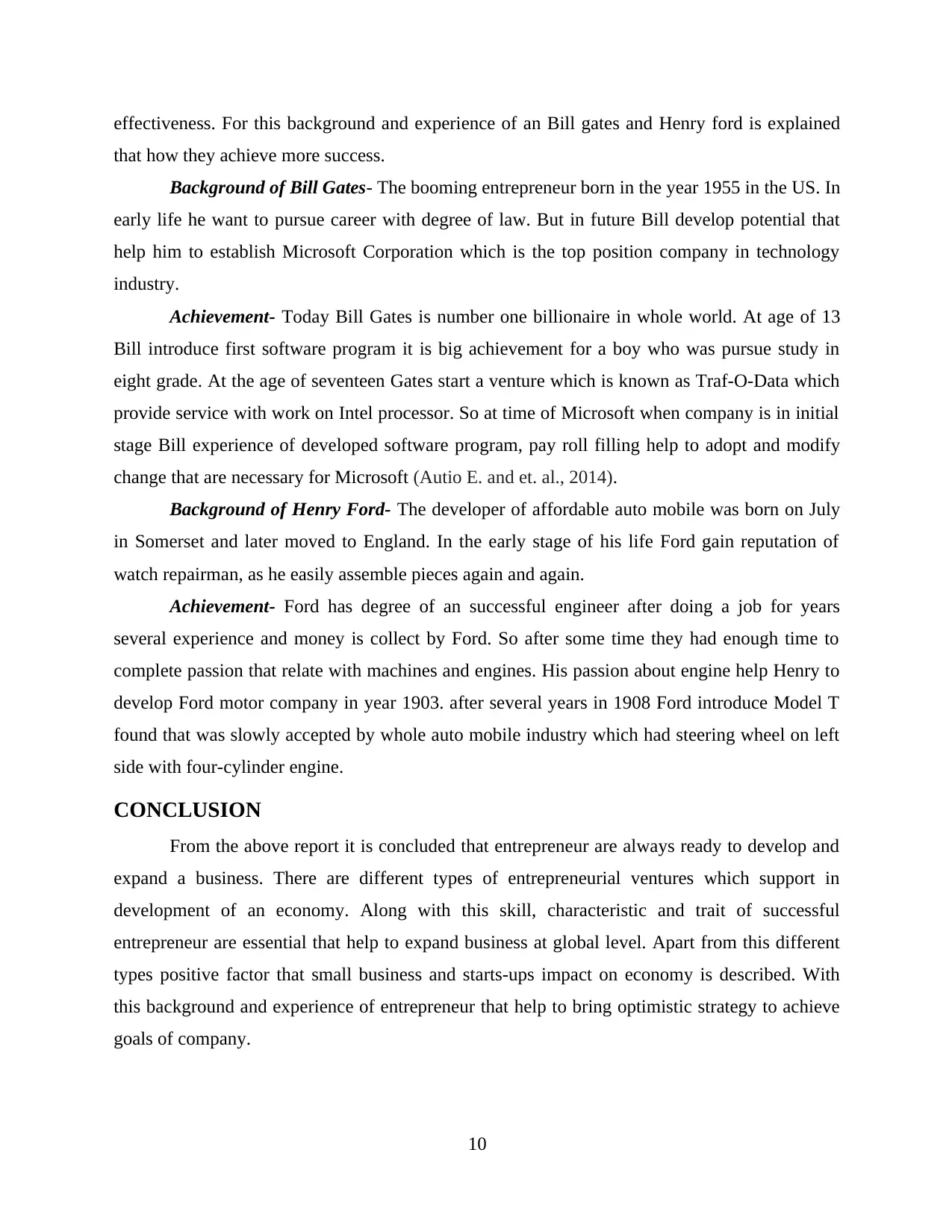
effectiveness. For this background and experience of an Bill gates and Henry ford is explained
that how they achieve more success.
Background of Bill Gates- The booming entrepreneur born in the year 1955 in the US. In
early life he want to pursue career with degree of law. But in future Bill develop potential that
help him to establish Microsoft Corporation which is the top position company in technology
industry.
Achievement- Today Bill Gates is number one billionaire in whole world. At age of 13
Bill introduce first software program it is big achievement for a boy who was pursue study in
eight grade. At the age of seventeen Gates start a venture which is known as Traf-O-Data which
provide service with work on Intel processor. So at time of Microsoft when company is in initial
stage Bill experience of developed software program, pay roll filling help to adopt and modify
change that are necessary for Microsoft (Autio E. and et. al., 2014).
Background of Henry Ford- The developer of affordable auto mobile was born on July
in Somerset and later moved to England. In the early stage of his life Ford gain reputation of
watch repairman, as he easily assemble pieces again and again.
Achievement- Ford has degree of an successful engineer after doing a job for years
several experience and money is collect by Ford. So after some time they had enough time to
complete passion that relate with machines and engines. His passion about engine help Henry to
develop Ford motor company in year 1903. after several years in 1908 Ford introduce Model T
found that was slowly accepted by whole auto mobile industry which had steering wheel on left
side with four-cylinder engine.
CONCLUSION
From the above report it is concluded that entrepreneur are always ready to develop and
expand a business. There are different types of entrepreneurial ventures which support in
development of an economy. Along with this skill, characteristic and trait of successful
entrepreneur are essential that help to expand business at global level. Apart from this different
types positive factor that small business and starts-ups impact on economy is described. With
this background and experience of entrepreneur that help to bring optimistic strategy to achieve
goals of company.
10
that how they achieve more success.
Background of Bill Gates- The booming entrepreneur born in the year 1955 in the US. In
early life he want to pursue career with degree of law. But in future Bill develop potential that
help him to establish Microsoft Corporation which is the top position company in technology
industry.
Achievement- Today Bill Gates is number one billionaire in whole world. At age of 13
Bill introduce first software program it is big achievement for a boy who was pursue study in
eight grade. At the age of seventeen Gates start a venture which is known as Traf-O-Data which
provide service with work on Intel processor. So at time of Microsoft when company is in initial
stage Bill experience of developed software program, pay roll filling help to adopt and modify
change that are necessary for Microsoft (Autio E. and et. al., 2014).
Background of Henry Ford- The developer of affordable auto mobile was born on July
in Somerset and later moved to England. In the early stage of his life Ford gain reputation of
watch repairman, as he easily assemble pieces again and again.
Achievement- Ford has degree of an successful engineer after doing a job for years
several experience and money is collect by Ford. So after some time they had enough time to
complete passion that relate with machines and engines. His passion about engine help Henry to
develop Ford motor company in year 1903. after several years in 1908 Ford introduce Model T
found that was slowly accepted by whole auto mobile industry which had steering wheel on left
side with four-cylinder engine.
CONCLUSION
From the above report it is concluded that entrepreneur are always ready to develop and
expand a business. There are different types of entrepreneurial ventures which support in
development of an economy. Along with this skill, characteristic and trait of successful
entrepreneur are essential that help to expand business at global level. Apart from this different
types positive factor that small business and starts-ups impact on economy is described. With
this background and experience of entrepreneur that help to bring optimistic strategy to achieve
goals of company.
10
Paraphrase This Document
Need a fresh take? Get an instant paraphrase of this document with our AI Paraphraser
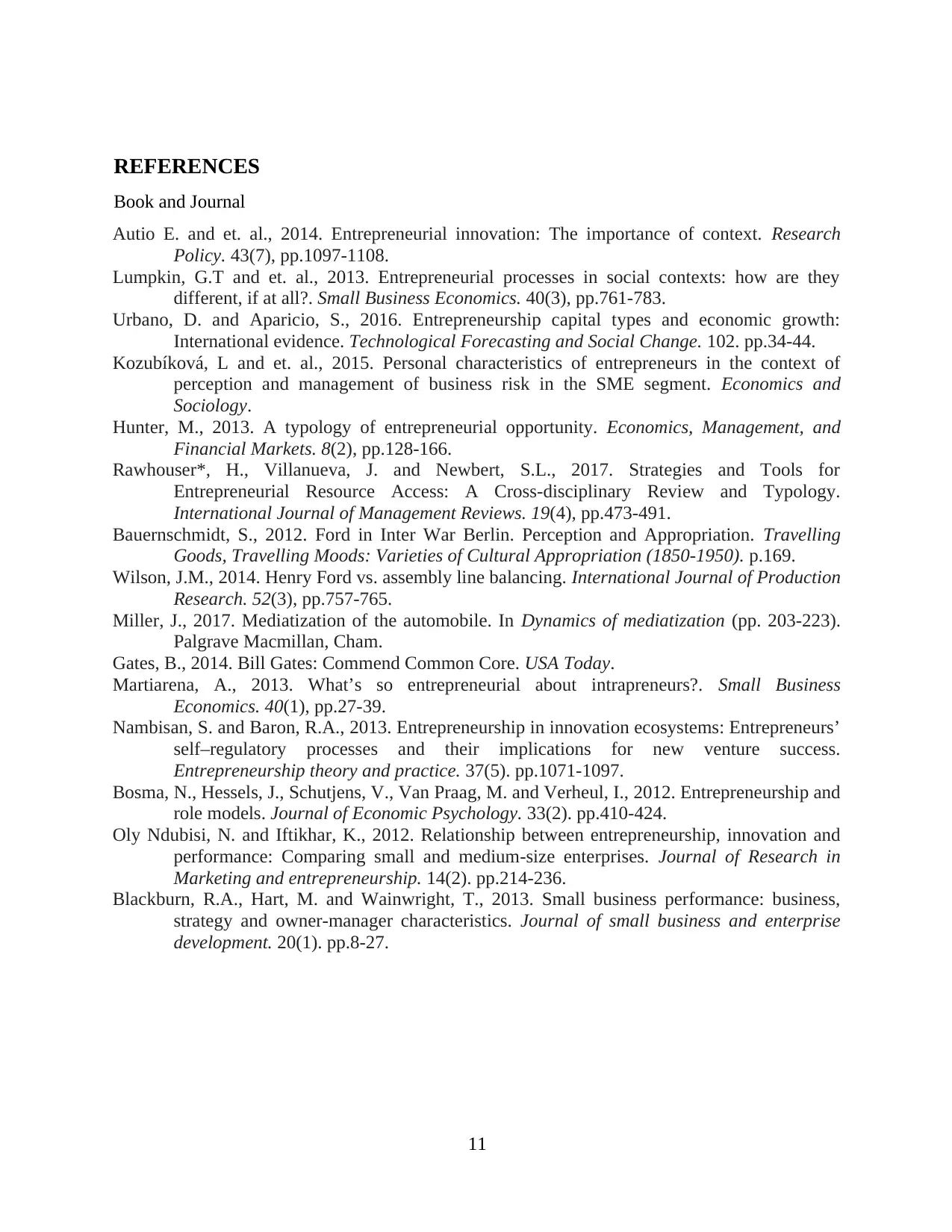
REFERENCES
Book and Journal
Autio E. and et. al., 2014. Entrepreneurial innovation: The importance of context. Research
Policy. 43(7), pp.1097-1108.
Lumpkin, G.T and et. al., 2013. Entrepreneurial processes in social contexts: how are they
different, if at all?. Small Business Economics. 40(3), pp.761-783.
Urbano, D. and Aparicio, S., 2016. Entrepreneurship capital types and economic growth:
International evidence. Technological Forecasting and Social Change. 102. pp.34-44.
Kozubíková, L and et. al., 2015. Personal characteristics of entrepreneurs in the context of
perception and management of business risk in the SME segment. Economics and
Sociology.
Hunter, M., 2013. A typology of entrepreneurial opportunity. Economics, Management, and
Financial Markets. 8(2), pp.128-166.
Rawhouser*, H., Villanueva, J. and Newbert, S.L., 2017. Strategies and Tools for
Entrepreneurial Resource Access: A Cross‐disciplinary Review and Typology.
International Journal of Management Reviews. 19(4), pp.473-491.
Bauernschmidt, S., 2012. Ford in Inter War Berlin. Perception and Appropriation. Travelling
Goods, Travelling Moods: Varieties of Cultural Appropriation (1850-1950). p.169.
Wilson, J.M., 2014. Henry Ford vs. assembly line balancing. International Journal of Production
Research. 52(3), pp.757-765.
Miller, J., 2017. Mediatization of the automobile. In Dynamics of mediatization (pp. 203-223).
Palgrave Macmillan, Cham.
Gates, B., 2014. Bill Gates: Commend Common Core. USA Today.
Martiarena, A., 2013. What’s so entrepreneurial about intrapreneurs?. Small Business
Economics. 40(1), pp.27-39.
Nambisan, S. and Baron, R.A., 2013. Entrepreneurship in innovation ecosystems: Entrepreneurs’
self–regulatory processes and their implications for new venture success.
Entrepreneurship theory and practice. 37(5). pp.1071-1097.
Bosma, N., Hessels, J., Schutjens, V., Van Praag, M. and Verheul, I., 2012. Entrepreneurship and
role models. Journal of Economic Psychology. 33(2). pp.410-424.
Oly Ndubisi, N. and Iftikhar, K., 2012. Relationship between entrepreneurship, innovation and
performance: Comparing small and medium-size enterprises. Journal of Research in
Marketing and entrepreneurship. 14(2). pp.214-236.
Blackburn, R.A., Hart, M. and Wainwright, T., 2013. Small business performance: business,
strategy and owner-manager characteristics. Journal of small business and enterprise
development. 20(1). pp.8-27.
11
Book and Journal
Autio E. and et. al., 2014. Entrepreneurial innovation: The importance of context. Research
Policy. 43(7), pp.1097-1108.
Lumpkin, G.T and et. al., 2013. Entrepreneurial processes in social contexts: how are they
different, if at all?. Small Business Economics. 40(3), pp.761-783.
Urbano, D. and Aparicio, S., 2016. Entrepreneurship capital types and economic growth:
International evidence. Technological Forecasting and Social Change. 102. pp.34-44.
Kozubíková, L and et. al., 2015. Personal characteristics of entrepreneurs in the context of
perception and management of business risk in the SME segment. Economics and
Sociology.
Hunter, M., 2013. A typology of entrepreneurial opportunity. Economics, Management, and
Financial Markets. 8(2), pp.128-166.
Rawhouser*, H., Villanueva, J. and Newbert, S.L., 2017. Strategies and Tools for
Entrepreneurial Resource Access: A Cross‐disciplinary Review and Typology.
International Journal of Management Reviews. 19(4), pp.473-491.
Bauernschmidt, S., 2012. Ford in Inter War Berlin. Perception and Appropriation. Travelling
Goods, Travelling Moods: Varieties of Cultural Appropriation (1850-1950). p.169.
Wilson, J.M., 2014. Henry Ford vs. assembly line balancing. International Journal of Production
Research. 52(3), pp.757-765.
Miller, J., 2017. Mediatization of the automobile. In Dynamics of mediatization (pp. 203-223).
Palgrave Macmillan, Cham.
Gates, B., 2014. Bill Gates: Commend Common Core. USA Today.
Martiarena, A., 2013. What’s so entrepreneurial about intrapreneurs?. Small Business
Economics. 40(1), pp.27-39.
Nambisan, S. and Baron, R.A., 2013. Entrepreneurship in innovation ecosystems: Entrepreneurs’
self–regulatory processes and their implications for new venture success.
Entrepreneurship theory and practice. 37(5). pp.1071-1097.
Bosma, N., Hessels, J., Schutjens, V., Van Praag, M. and Verheul, I., 2012. Entrepreneurship and
role models. Journal of Economic Psychology. 33(2). pp.410-424.
Oly Ndubisi, N. and Iftikhar, K., 2012. Relationship between entrepreneurship, innovation and
performance: Comparing small and medium-size enterprises. Journal of Research in
Marketing and entrepreneurship. 14(2). pp.214-236.
Blackburn, R.A., Hart, M. and Wainwright, T., 2013. Small business performance: business,
strategy and owner-manager characteristics. Journal of small business and enterprise
development. 20(1). pp.8-27.
11
1 out of 11
Related Documents
Your All-in-One AI-Powered Toolkit for Academic Success.
+13062052269
info@desklib.com
Available 24*7 on WhatsApp / Email
![[object Object]](/_next/static/media/star-bottom.7253800d.svg)
Unlock your academic potential
Copyright © 2020–2026 A2Z Services. All Rights Reserved. Developed and managed by ZUCOL.





